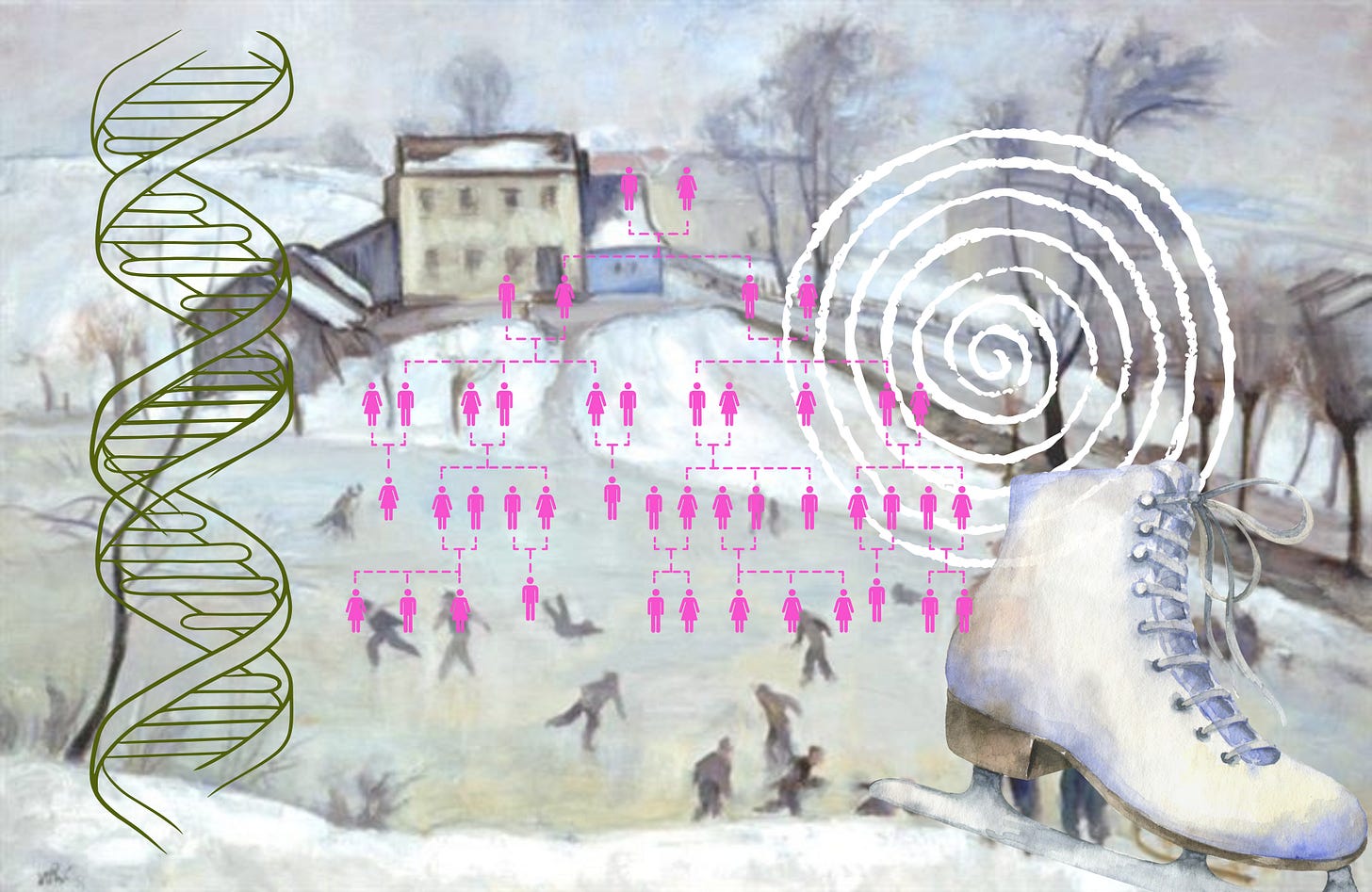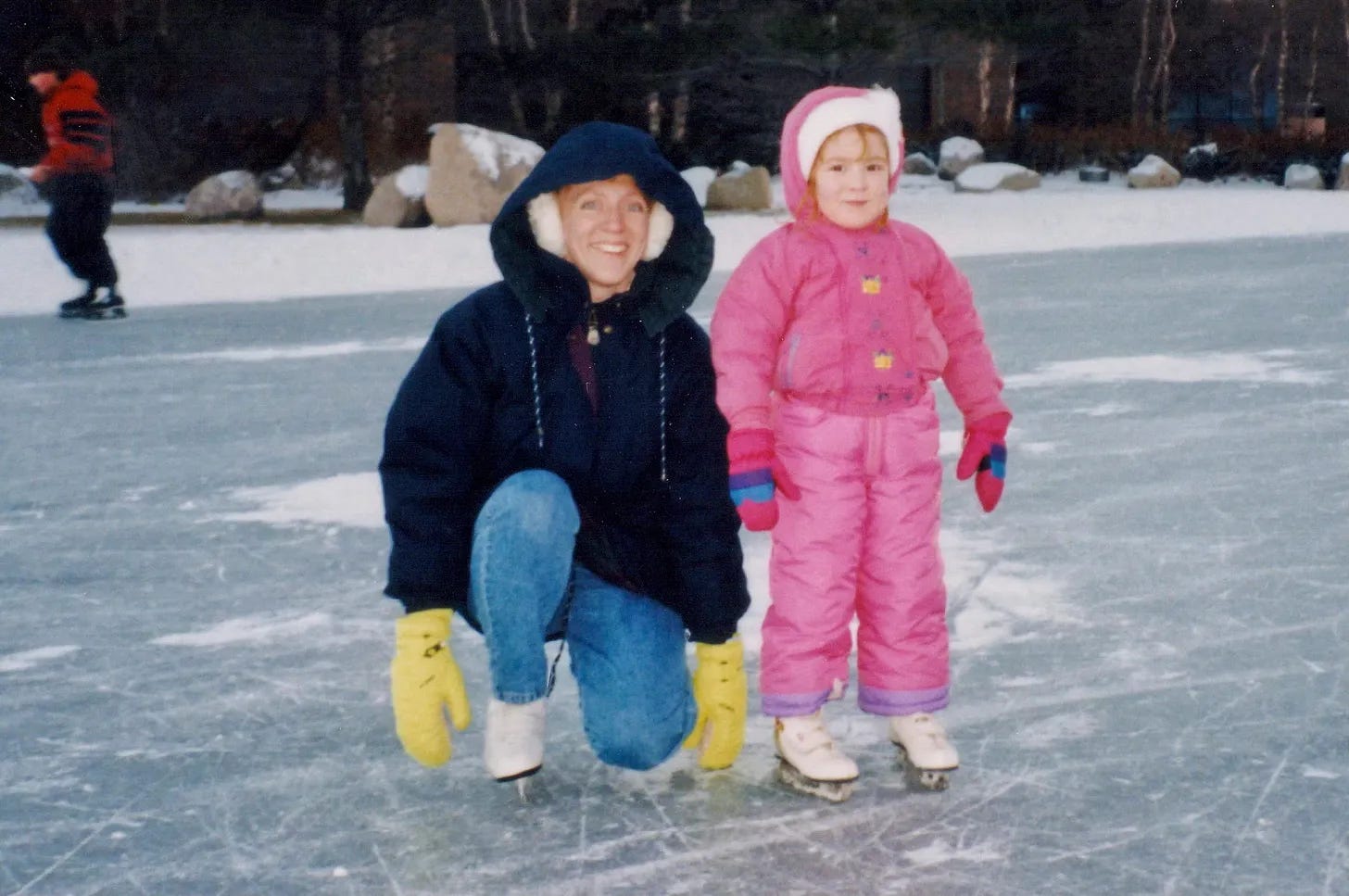We Call This Being Human
On shame, epigenetics, and generations of women learning how to break through
There was an old movie my siblings and I used to watch growing up, even though we were not, technically, allowed. It was an old VHS—a tape-recording from a made-for TV movie. Its peeling white label read: “ALASKA” in my mother’s curly block letters.
She did not want us watching this movie, but sometimes we could convince my dad to let us if Mom wasn’t home.
My mom thought one particular scene in the movie would traumatize us, especially because the movie is based on a true story—a woman hiking across a frozen lake in the Alaskan wilderness suddenly pauses when she hears a faint cracking sound. In one sudden rush of cold water, she breaks through the ice and becomes trapped underneath, unable to relocate the hole from which she fell.
She pounds on the ice for what seems like minutes on end, until she makes enough cracks with her fist to break through to the surface, gasping for air.
(See? Totally kid-friendly.)
I think the real reason my mom didn’t want us to watch this was because breaking through the ice and drowning was one of her worst fears.
The funny thing is, before I had ever laid eyes on that nail-biting movie scene, I shared this fear with my mom. My body already knew. I would skate over the frozen chain of lakes near my grandparents’ house and look down at the ice. With every shuffle of my Care Bear double-blade figure skates, I wondered what it would be like to fall through into the inky black water below.
When my mom was that age, she wondered too.
The way fears are passed down from generation to generation is still largely a mystery, but more and more scientists—epigeneticists—are beginning to understand.
We know, now, that fears can be inherited.
That our stories actually mark our genes.
That things are, perhaps, less coincidental than they may seem.
Other fears I’ve probably inherited:
-Fear of the guttural, animal feeling of my stomach emptying over the toilet
(We call this emetophobia.)
-Fear of being the center of attention
(We call this scopophobia.)
-Fear of staying soft, fear of loving, fear of trusting
(We call this being human, being human, being human.)
I often think about the women in my family—how so many of their stories remain a mystery to me, how so much of their emotional experience will never be put into tangible words, but will live on in our bodies, instead.
Which woman’s body held the first genes marked with the fear of staying tender, of fearing love and trust, of choosing walls and walls and walls?
Maybe it began with my mother, or my mother’s mother, or my mother’s mother’s mother.
Maybe it began with my ancestors on their Swedish farms with their red barns and cascading fields, or before that, with their indigenous ancestors who herded reindeer in the north, or before that, in Africa where all of humanity originated.
Maybe it began all the way back at the beginning, when our bodies were formed from the dust of the earth, which was formed from the dust of stars.
Maybe it began when we tasted shame for the first time—bitter in the mouth, cold and slick in the throat. How we swallowed it and felt it sit in our bellies—a hard pit. How we became aware of our own fragility and propensity to hide.
Maybe, what I’m trying to say is this:
We’re all just people, in the end.
When I rewatched the falling-through-the-ice scene with my husband, years ago, he asked me what I would do if I became stuck under the ice.
“I think…” I hesitate. “I mean, maybe I wouldn’t try so long….maybe I’d just let myself sink to the bottom peacefully?” I had said.
He gaped at me like I had just slapped him.
But I had lived this way before—letting myself drown in my shame like there were no other options.
I had loved people before who believed this was the only way to live.
I still do.
Two days after I go all over town proclaiming how I feel more secure than I ever have, how I am learning how to feel my feelings and thrive in my relationships, I find myself almost fully submerged in the bathtub, in a deep shame spiral.
(Karma really is a b*tch.)
I pull my head under the surface and stare up at the ceiling, even though the warm water burns my eyes.
I think about how this is what shame feels like. How it will suck you under and make it almost impossible to find your way back out again.
I think about the scene my mom never wanted me to see: the woman falling through the ice, holding her breath, her face turning purple, her inability to find her way back out again.
When I pull my head up out of the water, I find my breath and, along with it, the tiniest sliver of resolve.
“I feel afraid”, I say.
“I feel hopeless.”
I cry for little kid me who felt betrayed and left alone by her own family.
Then I put my hand on my chest and breathed.
This is my body, not sinking to the bottom.
This is my fist, pounding on the ice.
This is me, breaking through.
What makes shame even shamier (it’s a real word because I say it is) is when you feel like you should be better at escaping it by now.
But maybe shifting the epigenetic story doesn’t happen all at once.
Maybe one generation at a time, you break through the ice a little faster.
Maybe my mom broke through faster than her mom. Maybe I will break through faster than mine. Maybe my daughters will break through even faster than me.
And so on.
My friend and I sit on a bench at the nature center while our children run feral in the woods.
We are talking about winter—the coming cold, whether or not she will still want to bundle up and go outside in the snow even with a toddler, whether or not we think there will be enough snow to cross-country ski, whether or not the ice at the chain of lakes will freeze solid enough for skating.
“Sometimes I like to go ice skating after the kids are in bed,” she says.
“….Can I come?” I ask, because this, too, is how I am making cracks and breaking through. This, too, is me not sinking to the bottom, not hiding.
When she says yes, I think about Care Bear double blade figure skates, water so deep it’s the color of a bruise, the woman, her fist, the splintering cracks.
I think about my children and my children’s children and my children’s children’s children.
How maybe, when they go ice skating on their someday lakes near their someday houses, they will not think about the inky blackness and the cracks and falling through.
Maybe, they will only feel the wind in their faces.
Maybe, they will show us what it is to fly over something we only used to fear.








So beautiful. Thank you for sharing this.
I love: "This is my body, not sinking to the bottom.
This is my fist, pounding on the ice.
This is me, breaking through."
This is really beautiful, Krista! I’m going to be thinking about this for a while